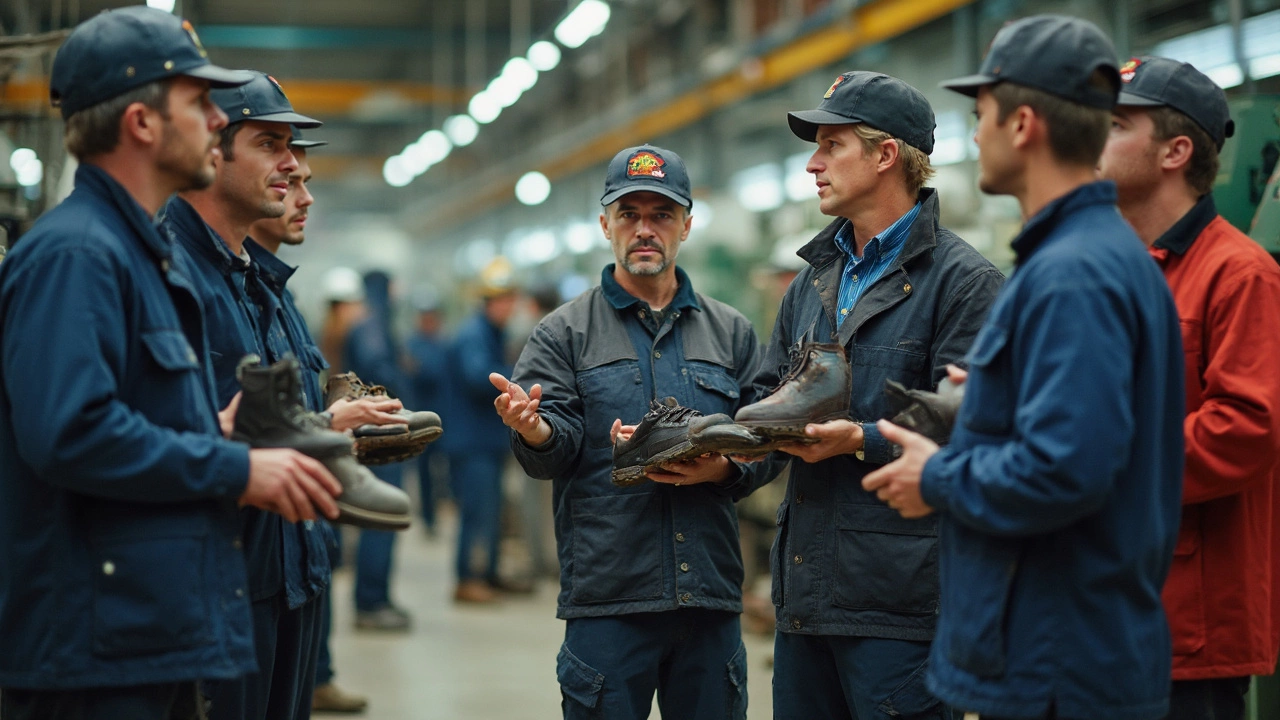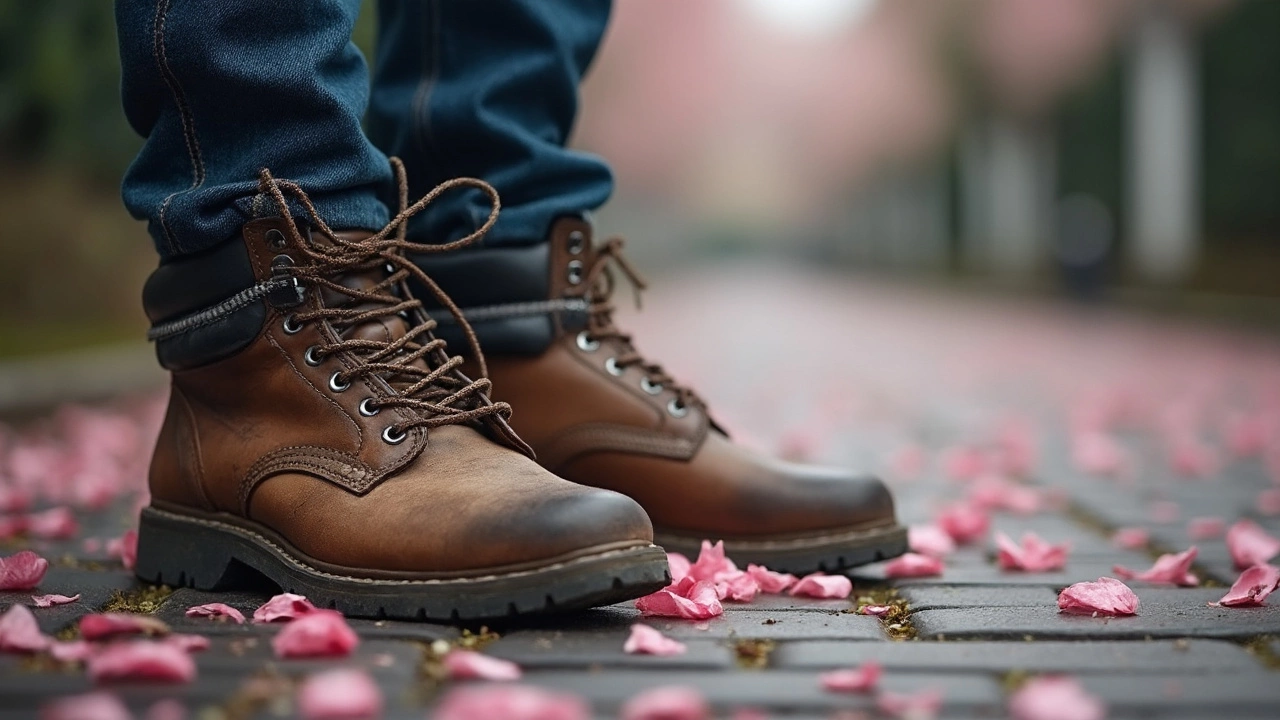Can a Company Force You to Wear Steel-Toe Shoes?

- Cleo Fairchild
- 17 March 2025
- 0 Comments
Ever wondered if your company can really make you wear those sturdy, awkward steel-toe shoes? You're not alone. Many employees find themselves scratching their heads over this, especially if they've never had to wrangle with footwear as part of their professional duties. Turns out, there's quite a bit to know about the intersection of safety, health, and footwear regulations.
First off, it's important to know who calls the shots in terms of safety at work. In many cases, laws and regulations—like the UK's Health and Safety at Work Act—make it clear that employers must ensure a safe working environment. But does that mean they can mandate specific shoes? Well, if the work involves risks like heavy items or machinery, steel-toe boots might indeed be on the list of must-haves.
- Understanding Safety Requirements
- Legal Grounds for Shoe Regulations
- Employee Rights and Options
- Practical Tips for Managing Steel-Toe Shoes
Understanding Safety Requirements
When it comes to work footwear, understanding why employers push for steel-toe shoes starts with grasping the basics of workplace safety. The primary goal here is to prevent accidents before they happen. Steel-toe boots are not just a suggestion—they’re a safety staple in many industries like construction, mining, and manufacturing, where the risk of foot injuries from falling objects is significant.
Work safety regulations, like those outlined by the Health and Safety Executive (HSE) in the UK, aren't just arbitrary rules. They are necessary protocols that companies must follow to protect their employees. These regulations often require risk assessments to determine if safety footwear is needed, and when steel-toe versions make the list, it's usually because the potential hazards are hefty.
Legal Requirements and Risk Assessments
Workplace laws are pretty clear about one thing: if the job is risky, companies must provide the right gear to buffer those hazards. Risk assessments are often the first step. Employers will assess scenarios that could harm workers, such as heavy machinery or tools that might drop. If these assessments indicate a threat to foot safety, steel-toe boots tend to be recommended.
- Identify potential risks: Employers must look at everything from heavy lifting to potential electrical hazards.
- Provide Personal Protective Equipment (PPE): If risks are found unavoidable, providing protective footwear becomes a must.
- Review Safety Conditions: It's not just about a one-time check. Conditions and safety requirements should be reviewed regularly to account for changes in the workplace.
Why The Fuss About Steel-Toe?
Steel-toe shoes aren’t just heavy duty for the thrill of it. These shoes can withstand loads of up to 200 joules, which is what you'd expect from a 20 kg weight dropped from about a meter. In simple terms, they act like protective armor for your feet. Having that extra layer of protection has proven effective in reducing serious injuries.
Understanding these requirements isn't just about compliance; it’s about keeping people safe and sound, so accidents don't spell disaster. Investors, managers, and employees alike benefit from a safer environment where the right protective gear, like steel-toe shoes, plays a starring role in minimizing injuries.
Legal Grounds for Shoe Regulations
When it comes to the issue of whether a company can force you to wear steel-toe shoes, the short answer is: yes, they often can. Safety regulations are no joke, and employers have a duty to keep their workers safe.
In the UK, the Health and Safety at Work Act 1974 is a big deal. It places a responsibility on employers to ensure their workplace is free from risks to health and safety. Now, if part of your job involves heavy objects that might squash your toes, companies are within their rights to require protective footwear.
Regulatory Framework
In addition to the Health and Safety Act, there's the Personal Protective Equipment at Work Regulations 1992 (PPE Regulations). These specifically state that personal protective equipment, including footwear, must be provided when risks can’t be controlled by other means. If you’re in a job where accidents involving feet could happen, like construction or manufacturing, these regulations back up the fact that your employer can insist on the right shoes.
“Employers must conduct a thorough risk assessment and provide necessary PPE to ensure worker safety,” says the UK Health and Safety Executive (HSE).
Understanding Employee Rights
While it's true that companies can require certain footwear for safety reasons, employees have rights too. If the shoes provided don't fit properly or cause discomfort, employees should absolutely bring it up. Employers are obligated to take reasonable steps to accommodate personal needs while maintaining safety standards. Open communication can often resolve these issues without much hassle.
It's essential workers understand these regulations to ensure both their rights and safety needs are met. If you're ever unsure, a frank chat with your supervisor or HR can help clear things up.

Employee Rights and Options
So, you're probably wondering if your boss can just decide you have to wear steel-toe shoes everytime you clock in. The short answer is: it depends, but traditionally, employees do have a say in what's going on their feet.
Here's the deal—navigating footwear regulations at work can be tricky. The law generally supports employers when it comes to ensuring workplace safety, which means they can enforce safety measures like required gear, including steel-toe shoes, especially in environments like construction sites or warehouses.
Understanding Your Rights
Now, while employers can require certain safety gear, you aren't completely at their mercy. Employees have the right to reasonable accommodations. This is especially true if there's a medical condition involved. For example, if steel-toe shoes aggravate a foot problem, discussing alternatives like composite-toe footwear, which offers similar protection but could be more comfortable, is perfectly justified.
Options to Consider
If you're struggling with the mandatory footwear policy, here are some steps to consider:
- Communicate: Talk to your HR department or safety officer about your concerns. Properly raising issues often leads to resolutions.
- Seek Accommodations: Get documentation from a healthcare professional to back up any medical-related requests. Options like orthotic insoles or different safety footwear might be viable solutions.
- Safety Equipment Allowance: Some companies offer allowances to purchase specific gear. Check if that's a possibility and ensure you get shoes that fit well and offer the necessary protection.
If you feel your rights are being violated, understanding local labor laws can be your best friend. Organizations like the UK's Health and Safety Executive (HSE) can provide guidance and ensure that workplace regulations are fair and lawful.
Practical Tips for Managing Steel-Toe Shoes
Wearing steel-toe shoes might seem like a drag, especially if comfort isn’t the first thing that comes to mind. But fear not! There are ways to make the experience a whole lot easier and even, dare we say, comfortable.
Get the Right Fit
The first step is getting the right fit. Seems like a no-brainer, right? But many folks don’t realize just how crucial this is. When shopping for those work safety shoes, try them on later in the day when your feet are at their largest. Make sure there's a thumb's width space between your longest toe and the tip of the shoe.
Add Some Comfort
Who says you can't invite comfort into the mix? Invest in good quality insoles to cushion your feet and reduce any hard impact. Look for insoles designed for shock absorption—they're a game-changer!
Break Them In
Don’t start wearing them all day right away. Instead, break them in slowly over a week or so. Wear them for a couple of hours each day to avoid blisters. Your feet will thank you!
Keep Them Clean
If your work kicks up a lot of dirt, make a habit of cleaning your shoes regularly. It'll not only make them last longer but also keep them looking presentable—because who wants to show up with shoes that look like they've survived a mudslide?
Replace When Needed
Check your shoes for signs of wear and tear. If the steel cap peeks through or the soles have split, it's time for a new pair. Wearing damaged shoes can be more unsafe than not wearing them at all!
Consider the Brand
Sometimes, it boils down to the make and model. Some brands cater to specific industries or work environments. Do a little research on the best brands for your specific job needs, and you might find a shoe that checks all the right boxes.
By keeping these tips in mind, you can make your steel-toe shoes experience less of a burden and more of a support during your work hours. Stay safe and step smart!


